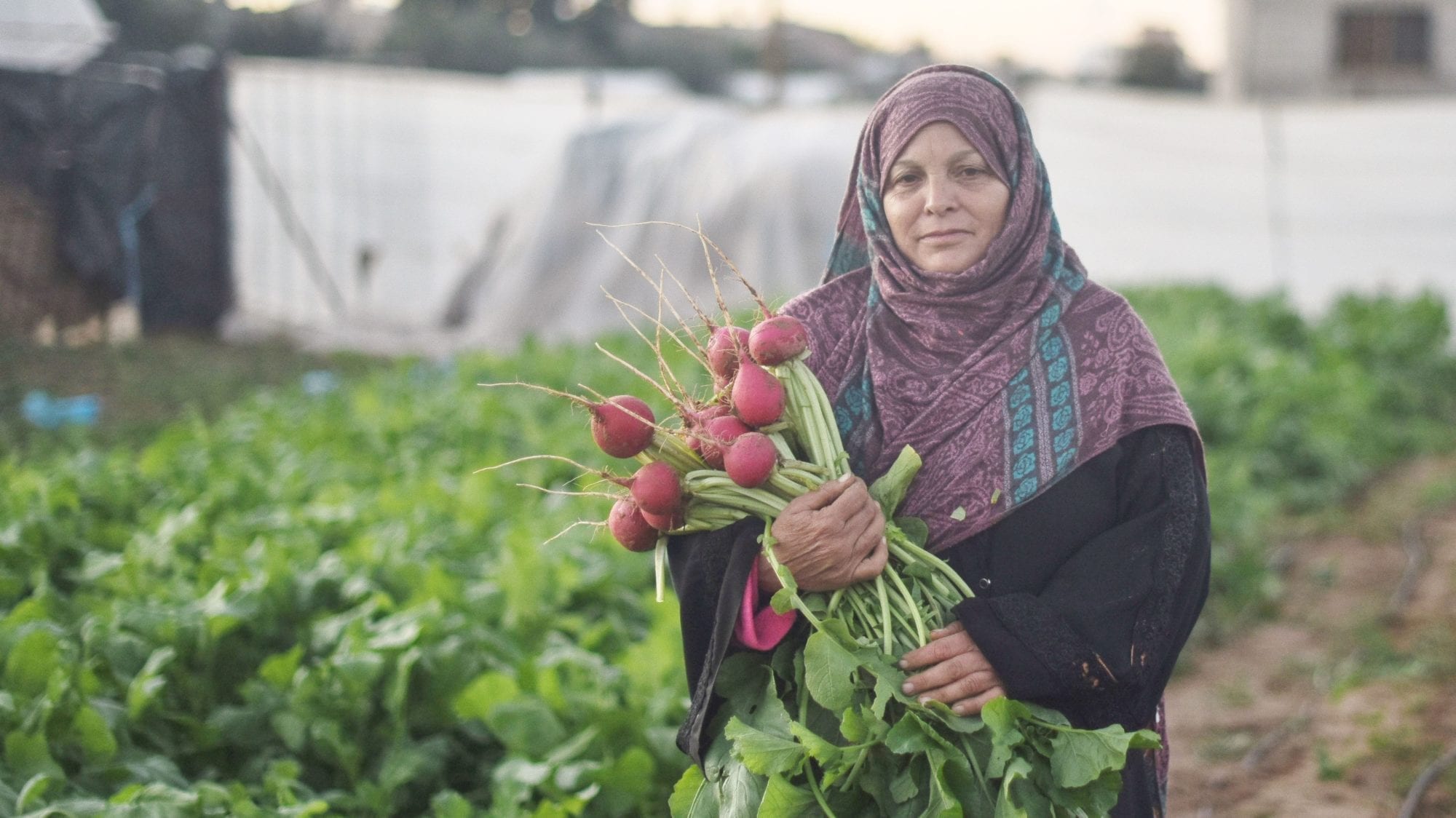
Apr 17, 2019
While all work has value, not every job is a “good job.” Millions of workers around the world, especially those in the informal sector, cannot enjoy the benefits of their own hard work and often are denied safe working conditions, social protections like health insurance, professional security and union rights and freedom.
The Solidarity Center partners with unions and other allies to support workers seeking to achieve decent work and dignity on the job, together. In Palestine, the Solidarity Center supports activists fighting for labor law enforcement and sustainable jobs, to improve the lives of all working people.
A new Solidarity Center photo essay, ’Sometimes I Am Lucky to Get A Task for Three Days’: Etaf Awdi Hamdi Eqdeeh, offers a look into the life of a mother and agricultural worker Etaf Awdi Hamdi Eqdeeh who lives and works in Khuza’a, near Khan Younis, Gaza.
Now in her 60s, Etaf visits area farms daily to look for any kind of temporary job because she cannot find a permanent job—and she helps support her multigenerational family.
“Sometimes I am lucky to get a task for three days,” she says.
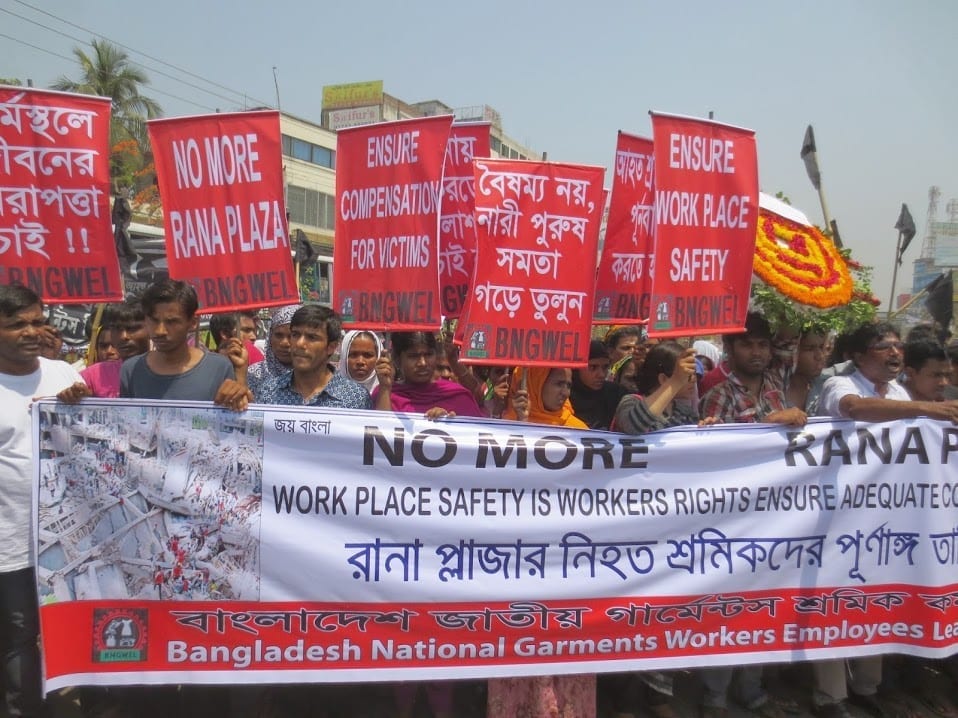
Apr 17, 2019
On a recent Friday, the only day off for Bangladesh garment workers—if they get a day off—I went to visit workers at their homes to better understand how the people who stitch our clothes live their lives. Walking through the puzzling narrow alleys, I entered a tin shed-like building. A corridor tore through the center and on each side were rooms for families. It was in one of these dimly lit rooms where I met Konika, who worked as a sewing operator in a nearby garment factory in Gazipur. In the tiny space where she lived with two children and her husband, she revealed the conditions at her workplace.
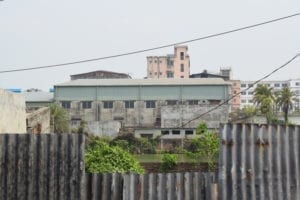
A garment factory in Gazipur. Credit: Solidarity Center/Istiak Ahmed Inam
“We are under intense pressure to meet the target production,” she says. “I used to produce 70 pieces an hour but now, after our minimum wage has been increased by the government, I must produce 90 pieces. I have to think twice if I want to use the washroom. What if I miss my deadline? What if my production manager sees me? I rest only if there’s a problem with my machine and am lucky if the mechanic is not close by.”
Worker Safety under Threat Again
Six years after the deadly April 24, 2013, Rana Plaza building collapse killed 1,134 garment workers and injured hundreds more, the government is on the verge of rolling back international safety inspections even as employers and the government are blocking workers’ ability to exercise their right to form unions to improve working conditions.
Disasters like Rana Plaza or the 2012 Tazreen Fashions fire, which together killed more than 112 garment workers, prompted global outrage and mobilized workers in protest of unsafe and deadly working conditions, forcing major fashion brands and Bangladesh suppliers to address safety issues. As a result, unions, suppliers and many international brands formed the Bangladesh Accord on Fire and Building Safety, a binding agreement that helped make many garment factories safer. Despite its success, however, the accord may be dismantled, leaving workers at the mercy of a system unprepared to improve factory safety, according to a recent report.
Meanwhile, fashion companies often send their own inspection teams to factories, but the effectiveness of these visits is debatable.
“Our managers make us tell the foreigners [safety inspectors] we don’t work until 10 p.m., that we receive our wages regularly and we even receive our doctor’s fees. None of this is true,” says Konika. On many occasions, the inspection team strolls around the factory, only gathering data from factory management and not from the workers, thus releasing inaccurate reports.
Konika and her co-workers face odds that would dishearten many: factory owners escalating pressure to produce and depriving workers of their basic rights, and corporations wearing a mask of “doing all they can” for workers, while in fact, doing nothing.
Yet Konika, on her day off, enjoys time with her family, despite recognizing the injustices she is likely to face tomorrow.
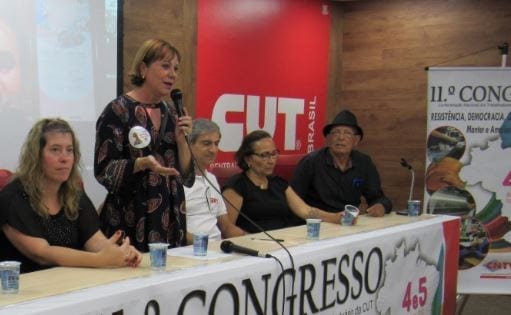
Apr 12, 2019
In a historic achievement, delegates to the 11th Congress of Brazil’s garment worker union federation, CNTRV (National Confederation of Clothing Workers) last week voted for gender parity in leadership and adopted a pro-women’s rights agenda.
The union achieved parity not only in the overall number of women and men in leadership, but also in its top executive positions.
“Women are empowered at the highest levels in the organization,” said CNTRV President Cida Trajano.
In partnership with the Solidarity Center, CNTRV in recent years ran a nationwide women’s leadership project, preparing women workers to assume leadership positions, according to Trajano.
“This is proof that the effort to form and organize feminist activism is worth it,” she said.
Over the next four years, CNTRV will focus on a pro-women’s rights agenda, including developing programs to combat gender-based violence at work and empower women workers; allow greater space for feminist agendas in communications; consult with women leaders and activists when developing recommendations for public policies affecting women; and expand women’s participation in collective bargaining and wage negotiations.
The Solidarity Center supports women workers seeking greater voice at the workplace across a range of employment sectors in Brazil, including the chemical, garment and hospitality industries, and domestic work. Together with the CNQ (National Confederation of Chemical Workers) CNTRV and CONTRACS (National Confederation of Service and Retail Workers), the Solidarity Center conducts trainings and campaigns to equip women to advocate for safer working conditions and more equitable salaries on the job, and to assume more active leadership roles in their unions.
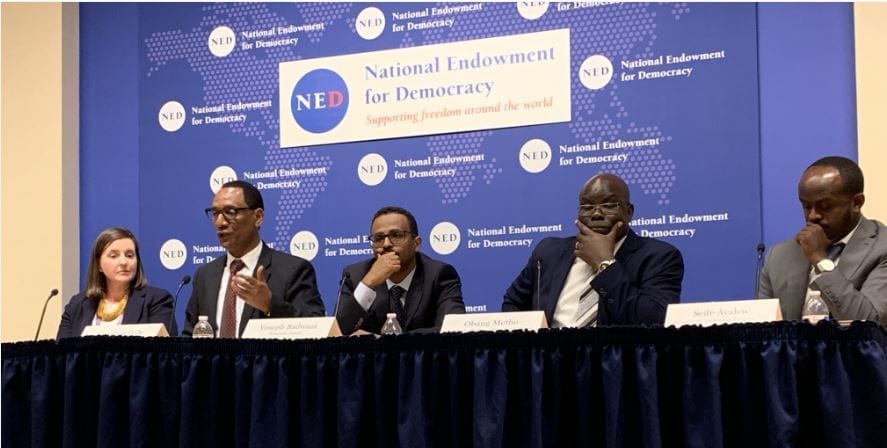
Apr 11, 2019
The democratization process that began after Prime Minister Abiy Ahmed took office in Ethiopia one year ago will run aground unless its citizens become increasingly rooted in inclusive civil society institutions, like trade unions, that are capable of overcoming deeply entrenched ethnic, cultural and geographic divisions, said Confederation of Ethiopian Trade Unions (CETU) President Kassahun Follo today in Washington, D.C.
Indeed, Ethiopia’s workers are already connected across regional and ethnic lines due to CETU’s countrywide reach and its inclusive approach to membership and worker rights. Follo, speaking at a National Endowment for Democracy (NED) panel discussion titled, “Ethiopia’s Democratic Opening One Year Later: Looking Back and Looking Ahead,” said organizations promoting inclusivity are crucial in a country where citizens from 80 ethnic groups are represented by more than 100 ethnically and regionally based political parties.
Taking advantage of an administrative structure that covers all nine regions of the country, CETU is uniquely positioned to take the democratization process beyond the capital, Addis Ababa, into lower levels of government across the country. “Change at the top is not enough,” said Follo.
CETU is Ethiopia’s largest multi-ethnic civil society organization, representing about 570,000 workers organized into nine affiliated industrial federations and approximately 1,700 trade unions. The federation, with Solidarity Center support, is striving to improve its member outreach programs through regional centers—in part to continue organizing in construction, agriculture and textiles sectors—but also to ensure that worker interests and recommendations are adequately represented to officials at all levels of government as the political and economic reform process moves forward.
Ethiopia has been one of the African continent’s best economic performers, growing at a rate of 10 percent for the past 15 years under state-directed development by a government that permitted no political opposition, but invested heavily in infrastructure, agriculture, education and other sectors. Although Ethiopia is the fastest growing economy in the region, it is also one of the poorest, with a per capita income of $783.
The country needs an economic transformation that parallels its political transformation, said Follo. Workers in Ethiopia’s industrial parks—established by government to encourage foreign direct investment (FDI)—earn poverty wages of less than $30 per month. CETU is therefore advocating with government and employers for any new labor law to include an adequate minimum wage.
“Otherwise, how can [workers] eat?” Follo asked.
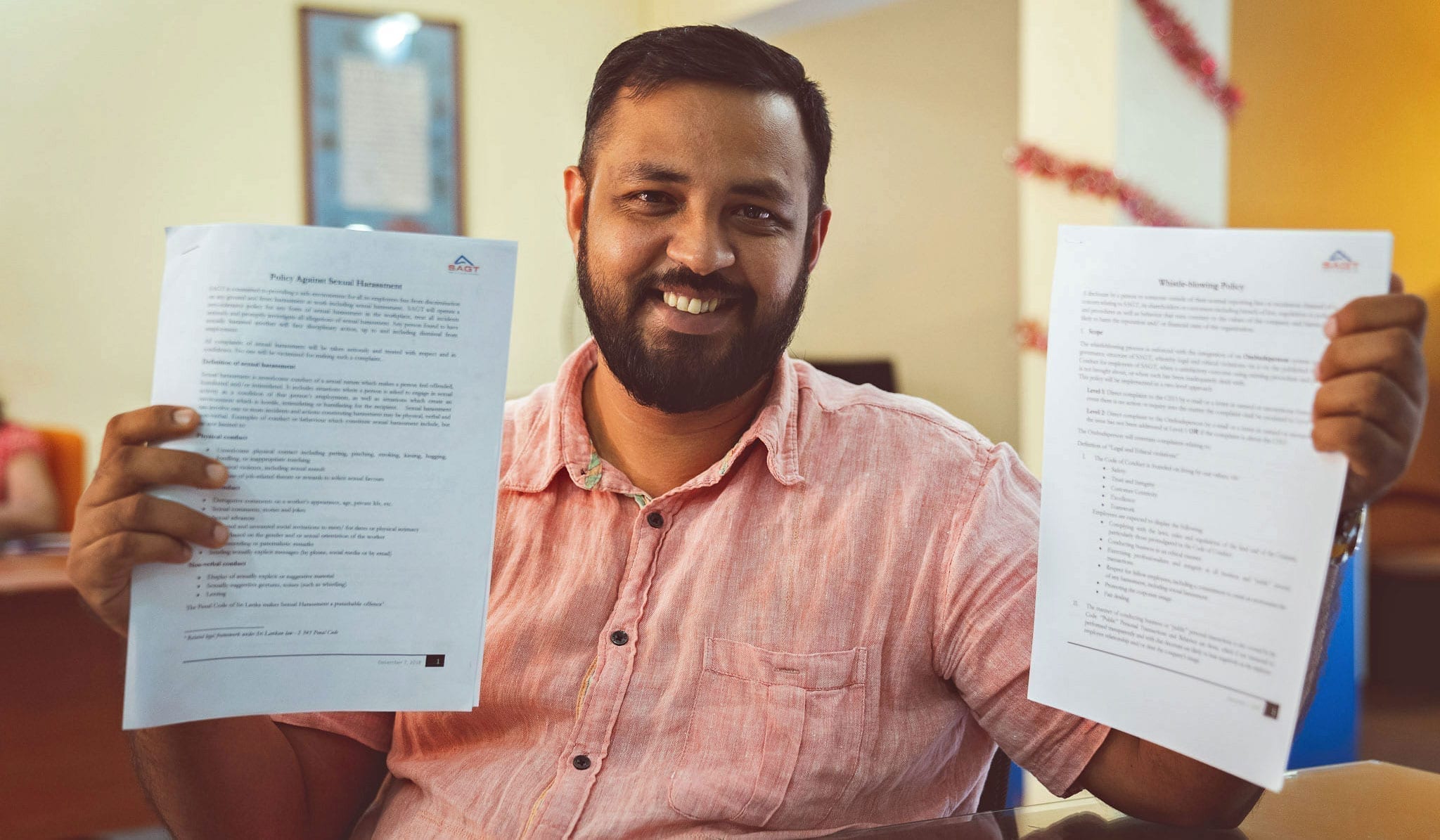
Apr 4, 2019
Union members in Colombo, Sri Lanka, successfully lobbied for a safer workplace by convincing their company to improve policy guidelines to help prevent gender-based violations in the workplace.
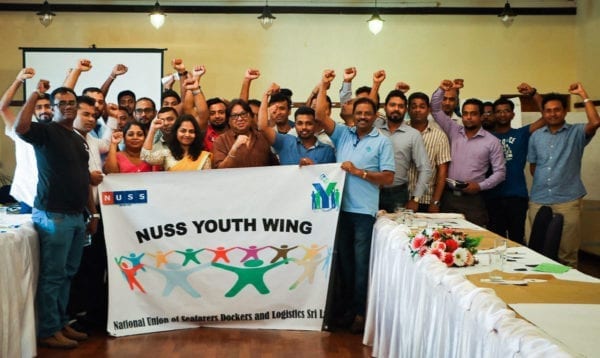
Union members in Sri Lanka celebrate a new workplace policy addressing sexual harassment. Credit: Solidarity Center/Sean Stephens
The effort was inspired by a Solidarity Center awareness-raising training in December on gender-based violence at work in which four workers from the South Asia Gateway Terminal (SAGT)—Ansley De Bruin, Mayura Kanchana, Nilanka Rathnayake and Ruwan Weerasinghe—took part. SAGT operates in Colombo’s shipping port.
“We have spoken to our [human resources] department many times over the past two years on setting a policy against gender-based violence in the workplace,” says Ansley De Bruin, youth wing president of the National Union of Seafarers Sri Lanka (NUSS). “We realized that it would be a hard push to get a code of conduct put in place regarding gender-based violence, so we felt the best thing to push for would be a whistleblower policy.”
After the training, the four participants again met with human resources. Based on their proposal, the organization not only introduced a whistleblower policy a couple of weeks later but also released a separate policy against sexual harassment.

Credit: Solidarity Center/Sean Stephens
The training program outlined incidences that constitute gender-based violence at work and the actions union members can take in supporting the adoption of a global ILO convention (regulation) on gender-based violence in the workplace. It was organized by the National Union of Seafarer’s Sri Lanka (NUSS), along with the International Labor Organization (ILO), International Transport Workers Federation (ITF) and Solidarity Center.
De Bruin says he is grateful SAGT understands its workers’ fundamental rights to a safe, violence-free workplace.
“This is not only a victory for the union but also for the organization and its staff. I would like to thank my organization the South Asia Gateway Terminal for hearing and implementing a system that protects all its staff.”








